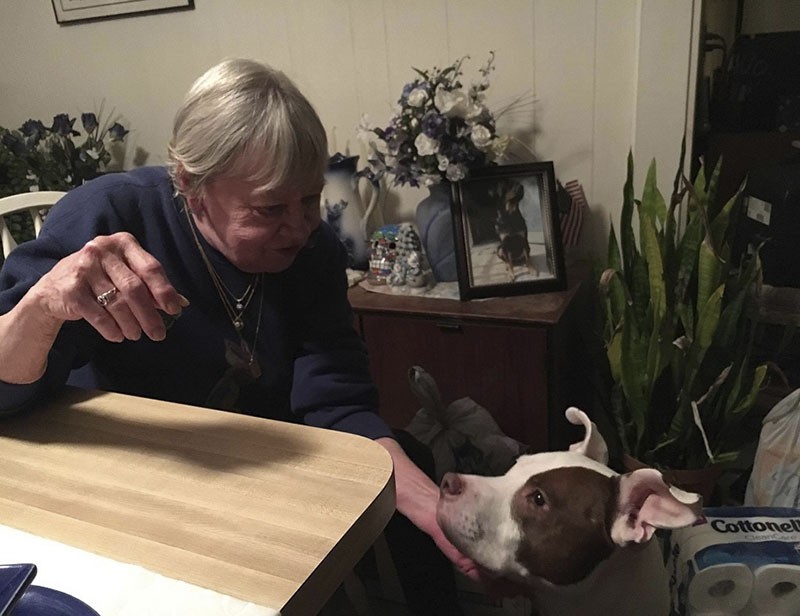In 2011, Nicole Bray thought she had found a treatment that might help her five-year-old son with his ADHD — a therapy dog. Her family adopted a boxer/mastiff mix named Gotti, and the two bonded immediately. He quickly became, Bray says, her son's best friend.
But despite Bray's hopes, Gotti would only stay with the family for about two weeks. That's because Bray lives in Florissant, which is one of many cities in Missouri with a total ban on pit bulls.
Bray's dog wasn't even a pit bull. But someone had reported to Animal Control that he looked like one, and three Animal Control officers showed up at Bray's home to to inform her that if she couldn't find a new home for him in seven days, he would be seized by the city and euthanized. Bray says they were "complete bullies," uninterested in her argument about Gotti's lineage.
"They said that I had the choice if I wanted to get a DNA test, but it would cost $500," Bray says.
She found a new home for the dog instead. Her son, she says, was heartbroken.
"It traumatized him," Bray says. "He ended up going back into therapy because of it."
While Bray's dog drew the city's attention after just two weeks, Mandi Kay Sullivan lived in Florissant for a year before authorities noticed her dog. Dexter is an American bulldog mix, also often considered a "pit bull type." Sullivan, a former dog trainer whose husband is a veterinary technician, thought Florissant's laws, like many other cities, merely required that her dog be licensed and microchipped.
"I didn't think anything of it, until one day we got the letter," Sullivan says.
Animal Control informed her that Dexter fell under the pit bull ban. He, too, was threatened with euthanasia.
Rather than have him killed, Sullivan found a home for him with her 75-year-old grandmother. The city's heavy-handed tactics still rankle her.
"He doesn't roam, he's never bit anyone, no one knows he's even there unless they see me walking him," Sullivan says. "I feel that it's incredibly unfair to punish him and to punish our family."
Florissant's ordinance has been in effect since 2010. It formally applies to three breeds of dogs generally considered "pit bulls" — the American Staffordshire terrier, the Staffordshire bull terrier or the American pit bull terrier — as well as any mixed breed dog with any of the three as "an element of its breeding." It also applies to any dog with "the appearance and characteristics" of a pit bull — and unless the owner pays for a DNA test, Florissant Animal Control generally relies on the opinion of whoever reports a dog as problematic.
Not all of those owners who've found themselves on the city's radar can find a new home for their dogs in a week. While Florissant recently started allowing shelters to pick up the dogs they confiscate, the city has euthanized 201 dogs since its ban went into law.
Bray and Sullivan's experiences led both of them to get involved with the Florissant Bully Alliance, the local group that hopes to end Florissant's pit bull ban and the dozens of others like it in Missouri. The local ordinances are collectively known as "breed specific legislation."
While there have been a handful of successes — Buckner, Missouri, repealed its ordinance last year — activists have been met with defeat both at the local and state level. Even as a phalanx of heavy hitters has come out in opposition to pit bull bans, including the American Society for the Prevention of Cruelty to Animals (ASPCA) and the American Veterinary Medical Association, the laws have stayed on the books. Last year, a bill that would have repealed all breed-specific laws in Missouri was shot down in the Senate. And in Florissant, a deadlocked city council has refused for years to put a repeal of its ordinance to a vote.
Residents like Sullivan say they still have hope.
"They're supposed to listen to the constituents," Sullivan says, "and we hope they'll listen to the people."
Regulation of dog ownership in America goes all the way back to 1897, when federal courts first found that it was constitutional to require owners to license their dogs. The court case behind the legal precedent, Sentell vs. New Orleans and Carrollton Railroad Company, is still relevant today: It found that dogs, because of their "hereditary wolfish instincts," are dangerous.
"Legislation of a drastic nature is necessary to protect persons and property from destruction and annoyance," the decision read. "Such legislation is clearly within the police power of the state. It ordinarily takes the form of a license tax, and the identification of the dog by a collar and tag, upon which the name of the owner is sometimes required to be engraved, but other remedies are not uncommon."
At that point, though, licensing was the main remedy. It wasn't until nearly a century later, in the early 1980s, that breed-specific legislation, or BSL, entered the scene, effectively banning certain dog breeds.
From the beginning, the laws targeted pit bulls. Pits remain the main focus of such ordinances to this day, although some laws also apply to other breeds, most often dobermans and rottweilers.
It's hard to pinpoint the exact cause of the legislative trend; in a legal article on the efficacy of breed-specific legislation, lawyer Linda Weiss argues it was as simple as increased public attention to a number of dog bite cases, several of them involving pit bulls.
"In the early 1980s, a number of fatalities and serious injuries caused by certain breeds, including pit bull dogs, brought to the public's attention a perceived need for more stringent laws governing restraint of dogs," Weiss wrote.
Mandy Ryan, the founder of the pro-pit organization Stop BSL Missouri, thinks pit bulls have an image problem owing to their owners more than their own behavior. In the '80s, she says, the dogs became associated with dogfighting, gang members and drug dealers.
"People started banning them because they didn't want dogfighting in their cities," she says. She finds that wrongheaded: "Really, they're awesome family dogs."
The movement to ban pits only gained steam, however. More than 700 jurisdictions in 42 states and the District of Columbia now have some version of a breed ban or breed-based regulations; fifteen of those have been challenged and upheld in appellate courts.
Missouri lawmakers are more partial to breed-specific legislation than most; a total of 86 jurisdictions in the state have some form of restriction, and all of them include, or are exclusive to, pit bulls, according to the pro-BSL website DogsBite.org. Some of these laws simply declare the breed "dangerous" or "vicious." Others require special licensing for pit bull owners, mandatory sterilization or microchipping.
Earlier this year, a bill was introduced in the Missouri legislature that would have effectively banned the bans, forbidding local jurisdictions from enforcing breed-specific legislation. HB 1811 was championed by members of the anti-BSL Florissant Bully Alliance and its statewide sister group, Stop BSL Missouri.
Activists hired lawyers and spent hundreds of hours lobbying. But while HB 1811 passed the House easily, it never made it out of committee in the Senate.
That's thanks to Senator Brian Munzlinger (R- Williamstown), who retired from the legislature in 2016 due to term limits. He simply refused to schedule the legislation for a vote, which was enough to destroy its chances. (Munzlinger declined to comment on the bill.)
Ryan says the senator offered her the justification that in his opinion, breed-specific legislation is already technically illegal in Missouri, thanks to a statute forbidding the state to "enact any ordinance or promulgate or issue any regulation, rule, policy, guideline or proclamation describing the relationship between persons and domestic animals as other than persons may or can own domestic animals." That was cold comfort to Ryan, though, since it did nothing to stop the bans on the books in Missouri municipalities from continued enforcement.
The bill's sponsor, then-Representative Ron Hicks (R-O'Fallon), agrees that the bill died in Munzlinger's office.
"I had everyone on the House side voting for that bill, and all of a sudden it died in the Senate," says Hicks.
Hicks owns a boxer, another dog breed that is often considered aggressive, and says he is tired of the stereotype that some breeds are inherently more aggressive than others. Enforcement, he says, should be targeted at irresponsible owners, not dogs.
"The more and more people are educated, and the more and more pit bulls that are around, you're going to see less and less aggression," he says.
Hicks says he sees several reasons to stop breed-specific bans like Florissant's. For one, they can be a waste of money; Florissant has spent $6,978.20 euthanizing pit bulls since 2011, according to public records obtained by Ryan's group.

For another, it's difficult for city workers to tell if a dog is a pit bull at all.
Dan Kolde, a lawyer on retainer for Stop BSL Missouri, says this is because pit bulls simply aren't a cohesive breed. The laws often target dogs based on appearance, but Kolde says this is as unconstitutional as a police officer giving you a ticket based on his feeling that you appear to be speeding.
To the American Kennel Club, a "pit bull" is merely the popular term for the American Staffordshire terrier, the American descendants of dogs bred in 19th century England to bait bulls. Nothing in its description suggests violence: "The Am Staff is a people-oriented dog that thrives when he is made part of the family and given a job to do. Regular exercise and training are necessary. They are natural clowns, so they tend to make training comical at times; they like to put a little twist on your training program."
But unlike the AKC's designation, BSL laws generally rely on visual information only. Similar-looking breeds like bulldogs or boxers might not be named in the laws, but owners have to rely on the hope that their neighbors won't decide their dog "looks like a pit."
"There is no such breed as a pit bull, and what does 'look like' mean?" Kolde says. "You can't follow a law like that. From a legal standpoint, what does that even mean?"
Hicks agrees; during the Missouri House hearing on HB 1811, he showed his colleagues pictures of various similar-looking breeds and asked them to identify which ones were pit bulls.
"Ninety-five percent of the people were wrong, and the other five said they guessed and got lucky," he says.
That leaves pit bull owners to face an uneven enforcement of laws and no presumption of innocence, Kolde says; if your dog is thought to look like a pit bull, the assumption is that it is one, and that the ban has been violated.
"The government has just kind of been coming in and bullying people," Kolde says.
Ledy Vankavage, an attorney who helped advocate for HB 1811 on behalf of Best Friends Animal Society, believes that pit bull bans are an infringement on property rights. And while she calls the often faulty visual identification of pit bulls "canine profiling," she says there's another type of profiling at work too: race- and class-based hostility toward the dogs' owners.
"It's oftentimes the other end of the leash," Vankavage says. She believes many of the communities passing pit breed-specific legislation are doing so because they see pit bull owners as predominantly poor and black.
In 2010, when Florissant's pit bull ban was first signed into law, Vankavage testified against it to the city council. The city's former mayor, who is now deceased, tracked her down afterwards to make it clear that while he understood her point, that wasn't what the law was really about, she says.
"We're not doing this because of the dogs," he told her. "We don't want those kind of people moving into Florissant."
Mandy Ryan's path to pro-pit activism began when she was working as an animal control officer in Columbia, Missouri. There, she says, she saw vicious dogs of every breed, and the trauma that could be caused by dog attacks.
But she also saw something else when she and her colleagues visited jurisdictions that had implemented breed-specific legislation: dogs that were not violent, being taken from loving owners to be re-homed or euthanized.
It was hard to watch, and seemed like a waste of money and of her and her colleagues' time.
"I just saw how many issues those cities have," she says. "They cause more issues than they prevent."
Frustrated, she created the Stop BSL Missouri Facebook page mostly as a discussion group for workers in similar situations, enforcing laws they didn't agree with.
"It just kind of blew up from there," Ryan says.
Ryan's Facebook page started receiving messages from people who were losing their dogs due to local BSL laws and didn't know how to fight back. Ryan helped residents set up local organizations, with the Florissant Bully Alliance becoming one of the most active. From those humble beginnings, Ryan's organization has became a social media hub for pit bull owners, a resource for those dealing with bans in their communities and, eventually, the leading anti-BSL advocates in Missouri, lobbying governments on the state and local level.
What Ryan saw in her work has been echoed by many organizations and experts that study dogs and their behavior, including the National Animal Care and Control Association, which represents workers with jobs like Ryan's old one for the county. Many experts believe that breed bans simply aren't an effective way to counteract aggression or reduce dog bites. The Centers for Disease Control and Prevention, for example, has said that breed-specific legislation isn't an effective way to reduce dog bites, and has stopped tracking dog bite instances by breed.
"I've never personally met someone who works in the animal field who supports BSL," Ryan says.
Ryan's efforts drew a host of activists; even Ryan's own mother got involved. Karen Runk says she first became interested in the issue when she adopted a pit mix from Springfield, who would otherwise have been euthanized due to the city's pit bull ban.
"I personally don't think any dog should be put down if it hasn't done anything wrong," she says.
Runk is one of several activists who frequently attend Florissant city council meetings, lobbying the council's nine members to repeal the ban. The members are still divided; Runk thinks three members would vote to repeal and four never will. The last two she's still not sure about.
Although they haven't been able to force a vote yet, Runk still thinks the group's work has been effective.
"In the beginning, I didn't think they were going to do anything about it, and now they're talking about it," Runk says.
Ryan says the organization has even changed the mind of Florissant's mayor, Tom Schneider. Initially a supporter of breed specific legislation, he recently helped the Bully Alliance meet one of its goals by allowing pit bulls in the custody of Florissant's animal control department to be adopted out instead of euthanized. (Schneider did not return two calls seeking comment; members of the Florissant city council also did not respond to requests to talk.)
Keith English, the Democrat who is Florissant's newly elected representative in the Missouri statehouse, also opposes breed-specific legislation. He attempted to change Florissant's law in the city council when he was a member, and is now considering reintroducing a new version of HB 1811. He says it could easily pass the house again.
"I do believe we'll see something in writing in Jefferson City," English says.
Mostly, though, the opponents Ryan encounters aren't open to changing their minds. She understands that a bad encounter with a particular breed can leave a lasting, traumatic impression, but says many people who support BSL simply don't know anything about dogs.
"It's fear," she says. "Fear of the breed or fear of change."

For all of the consensus against breed-specific bans, it's an undeniable fact that dogs bite, and sometimes kill. And that is also true of pit bulls — even pit bulls who weren't abused in their youth.
St. Louis native Adonis Reddick, who was profiled in the RFT in June, was beloved locally as a disability rights activist. He'd helped a friend and roommate care for her pit bull, Milow, since the dog was a puppy, and he kept Milow after she moved out.
As the RFT reported, Reddick's daughter, Danielle, had her concerns about Milow, who "just went crazy" after he spotted her infant daughter. But Reddick didn't want to turn the dog over to a shelter where he might be euthanized.
On May 11, Reddick's father and brother found Reddick in a pool of blood and Milow barking, teeth bared. Reddick's family called 911. The police officers who responded shot the dog and later confirmed Milow had killed his guardian.
"All we know is the dog got at him, and we don't know why," Aaron Reddick, Adonis' father, told the RFT. "We'll probably never know."
Stories like Reddick's resonate, and the Internet offers dozens more examples. These stories often shape public policy. In June, Christiane Vadnais was killed by a dog that may or may not have been a pit bull in Montreal, Canada. After a long court battle, the pit bull ban introduced in the immediate aftermath of Vadnais' death went into effect in the Canadian city on December 1.
In the comments section of any story relating to pit bulls, you can find the two factions battling it out: the pro-pit bull side is fiercely defensive, often testifying emotionally to the safety and sweetness of their pets, while the anti-pit bull group retaliates with anecdotes of the dogs' violence, excoriating anyone who defends them or would allow a child to be around them.
Many online debates have a few of the same recurring characters. There's Jeff Borchardt, the leader of the somewhat hysterical Facebook group "Against the Pit Bull Propaganda Machine." There's Merritt Clifton, a longtime blogger and purveyor of misleading statistics about the danger of pit bulls.
Then there's Colleen Lynn, the closest thing the nebulous anti-pit bull movement has to a leader. Lynn operates DogsBite.org, which (unlike many of the other sites on the topic) is well-organized and professional; she's a web designer by training. She was attacked by a pit bull while on a morning jog, a frightening episode that made her an activist.
Describing the attack on her website, Lynn recalled the horror in a vivid present tense account. "I am terrified of releasing my hand that is covering the wound. I fear that I will see bones and ligaments popping out," Lynn wrote. "Worse, I fear that the ONLY thing that is keeping my right forearm connected to my body is my left hand. To let go would force me to see that the dog had actually bitten my arm into two pieces."
DogsBite chronicles hundreds of dog attacks, many of them fatal. It also rigorously documents laws on the state, county and local level that govern dog ownership, offers tips on avoiding dog attacks, counters "pit bull myths" and hosts a blog that covers what Lynn sees as the failure from animal rights activists to consider the experiences of dog bite victims. There are no reliable statistics on how many pit bull attacks occur in the United States, or how many of them are fatal, but Lynn makes a valiant effort to track down each one that makes the news.
"We all miss the person we were prior to the attack," Lynn wrote. "The trauma of a violent dog attack, along with the subsequent minimization of it by social forces, forever removes parts of a person. These missing parts are often aspects of an individual's identity and trust systems. The process of rebuilding them takes time. Four years later, I think I am about half way there."
The site directs readers to the donation funds of many victims of severe dog attacks, but it also offers a degree of disdain for owners whose dogs attack them or their children. "No information was provided about where the mother located the dog — on Craigslist, Facebook or a rescue dog forum board?" the DogsBite blog asks scornfully about the mother of a four-year-old girl who was killed by a recently adopted doberman. (Lynn said she would not have time for an interview with the RFT.)
Brent Toellner, an animal rescue worker and blogger who frequently takes on anti-pit bull tropes on his website, KC Dog Blog, says the arguments can be fierce. "There can be a lot of junk that gets spewed online. Online comments sections are like that."
Toellner started doing research on pit bulls when he was considering adopting one twelve years ago. He did, and then did even more research when Kansas City, where he lives, was considering a breed ban. The ban didn't pass, but Toellner used his new knowledge to begin talking about pit bull issues.
Toellner believes that sites like DogsBite.org are full of "errors of omission" — the omission being the professional consensus against breed bans. And that helps elected officials believe that the issue isn't settled.
"These debates are pretty one-sided when it comes to the information that's out there," Toellner says. "It's pretty overwhelming."
Mandy Kay Sullivan, whose pit bull currently lives with her grandmother, won't make the same mistake twice.
She's planning on moving out of Florissant soon, and this time, she says she will do the research and make sure wherever she lives doesn't have breed-specific legislation.
"I will not move somewhere where I can't have my dog," Sullivan says.
But Sullivan and activists like her still have hope that ordinances like Florissant's may someday seem as antiquated as laws against swearing, or interracial marriage.
Stop BSL Missouri is still looking for a member of the state legislature that would be willing to sponsor a new version of HB 1811. Then they'll gear up for another round of legal arguments, personal testimony and lobbying. Ron Hicks, the former state rep from O'Fallon, says he believes the bill could easily pass the House again.
"We just need to get it to a vote in the Senate," Mandy Ryan says.
The fight in Florissant is continuing, too.
In 2017, a mailer will go out to the city's residents asking again for their opinion on the pit bull ban. Ryan hopes that it will be followed by a public vote to repeal the ban.
"It costs like $10,000 to put it on the ballot, so we were like, 'OK, you're the city,'" she says. "'You can put it on the ballot.'"
While she knows some members of the city council don't want a public vote on the issue, she hopes the public opposition will eventually become impossible to ignore.
Brent Toellner also believes things are getting better for pro-pit bull activists.
In recent years, he says, DNA testing of dogs and behavioral science have advanced to the point where breed bans will become more and more difficult to enforce. Cities are now more likely to repeal a breed ban than to pass a new one.
"There were a lot more people going through a similar situation in 2005 than there are now," he says.










